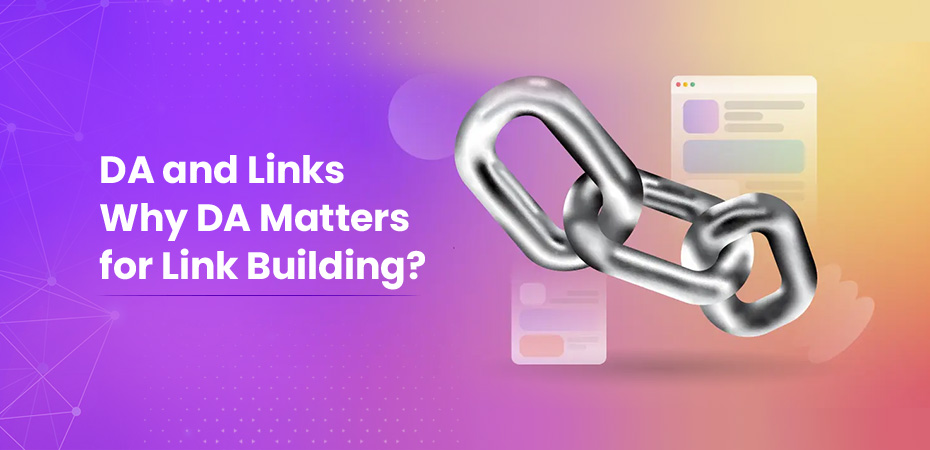DA and Links: Why DA Matters for Link Building?



In the world of SEO, Domain Authority (DA) and link building are critical factors for improving a website’s visibility and search rankings. However, there is often confusion about how these concepts interact, why they matter, and how to effectively leverage them to boost your site’s SEO performance.
This guide will dive deep into what Domain Authority is, why it matters for link building, and actionable strategies to help you improve both. We’ll also clear up common misconceptions and provide a clear path for boosting your website authority ranking.
What is Domain Authority?
Domain Authority (DA) is a metric developed by Moz that predicts how well a website will rank in search engine results pages (SERPs). It ranges from 1 to 100, with higher scores corresponding to a greater likelihood of ranking. DA is not a ranking factor used by Google itself, but it is a valuable SEO metric for assessing the overall “authority” of your website.
Factors That Influence Domain Authority
Several factors influence your website’s DA, including:
- Number of total links: Having more backlinks, especially from high-authority websites, improves your DA.
- Linking root domains: The diversity of unique websites linking to your content plays a significant role.
- Domain age: Older, established domains tend to have higher DAs due to their credibility.
- Content quality: Fresh, relevant, and valuable content that gets linked to frequently increases your DA.
- On-page SEO: Technical elements like mobile optimization, page speed, and internal linking also contribute to your site’s DA score.
The Domain Authority score depends on the industry and competition. For most websites, a DA between 40-60 is considered average, 60-70 is good, and anything above 70 is excellent. What is a good authority score? In general, a higher DA means you’re more likely to rank well, but it’s important to focus on improving both your DA and overall SEO strategies.
How is Domain Authority Calculated?
Domain Authority is calculated by using a combination of factors, including:
- Linking root domains: The number of unique websites linking to yours.
- Total number of backlinks: The overall volume of links, though quality matters more than quantity.
- On-page SEO factors: Things like mobile optimization, fast loading times, and site security (HTTPS) also play a role.
DA is calculated using a machine learning algorithm that predicts how likely your website is to rank relative to others based on its link profile and other SEO factors.
You can track your website’s DA score using tools like Agency Dashboard, Ahrefs, or SEMrush. These tools allow you to check your DA backlinks, domain metrics, and overall website authority ranking.
What is Link Building?
Link building is the process of acquiring hyperlinks from other websites to your own. These links, also known as backlinks, act as “votes” from one site to another, signaling to search engines that your site is trustworthy and authoritative.
Why Backlinks Matter in SEO
Backlinks are one of the most important SEO factors for ranking on search engines. When a high-DA website links to your page, it’s seen as an endorsement, and the link authority is passed from one site to another. Search engines like Google use this information to determine how credible your content is. High authority link building is essential because it boosts your site’s DA rankings and increases your chances of ranking higher in SERPs.
Why Linkable Content Ranks Higher
Creating linkable content is one of the most effective ways to improve your DA and rankings. Linkable content refers to valuable, shareable pieces that naturally attract backlinks from other websites.
High-quality content not only earns backlinks but also improves your site’s overall engagement metrics, such as time on page and bounce rate. These signals tell search engines that your content is valuable, further boosting your DA ranking and improving your chances of ranking for important keywords.
Types of Linkable Content
- Long-form blog posts: In-depth articles tend to rank higher and attract more backlinks.
- Infographics: Visual content is highly shareable and often gets cited in other posts.
- Original data and research: When you publish new findings, other sites are more likely to link back to your research.
- Guides and tutorials: Step-by-step content that solves a problem is highly valuable and often linked to by other sites.
Why Domain Authority Matters for Link Building
DA as a Benchmark for Backlink Quality
Domain Authority is often used as a benchmark to evaluate the quality of a potential backlink. Websites with higher DA scores tend to pass more “link juice”, which can significantly impact your website’s ranking. A high-DA backlink indicates that a credible site endorses your content, which signals to search engines that your site is also trustworthy.
DA in Competitor Analysis
By examining the DA score of competitors, you can gain insights into their link-building strategies. For example, if a competitor has a high DA, they likely have strong backlink profiles. Understanding this can help you identify opportunities to acquire similar or better backlinks.
Techniques to Improve Domain Authority for Link Building
The following strategies help you witness a domain authority increase for your website.
Prioritize Quality Over Quantity
When it comes to link building, it’s easy to get caught up in the numbers game—acquiring as many backlinks as possible. However, search engines like Google value quality over quantity. A single high-authority backlink from a credible, established website can be more beneficial than dozens of low-quality backlinks from unknown sites.
How to focus on quality:
- Target websites with a good Domain Authority score (40+).
- Focus on relevance—links should come from websites that operate within the same industry or niche.
- Engage in authority link building by reaching out to reputable websites, influencers, and brands that share your target audience.
Focus on Building Links from High DA Websites
Getting links from high DA websites is key to passing valuable link authority to your domain. Links from websites with a high DA rating indicate to search engines that your site is trustworthy and authoritative.
How to target high DA sites:
- Perform outreach to authoritative sites in your niche. Look for sites with a DA rank above 50 and propose guest posts or content collaborations.
- Use tools like Moz, Ahrefs, Agency Dashboard and SEMrush to identify websites with high DA rankings that are open to link partnerships.
- Engage in broken link building: Find broken links on high DA websites and offer your content as a replacement.
Build a Diverse Link Profile
Having a diverse backlink profile from different domains shows search engines that your website has widespread authority and relevance. A diverse profile doesn’t just rely on one type of website or a few backlinks, but instead pulls from various industries, content types, and authority levels.
How to diversify your link profile:
- Guest post on blogs, contribute to forums, and engage in discussions on social media platforms.
- Build backlinks from different domains, such as news outlets, educational websites, blogs, and industry-specific sites.
- Don’t limit yourself to one type of content. For example, include backlinks to videos, infographics, and whitepapers to expand your reach across different media types.
Create Linkable Content Consistently
The best way to attract backlinks organically is by consistently publishing linkable content—content that is valuable, shareable, and provides answers or solutions. This content will naturally earn backlinks from other websites because it adds value.
How to create linkable content:
- Publish research studies, industry surveys, or long-form guides that are data-driven and offer unique insights.
- Create visual content like infographics and videos, which tend to get more shares and DA backlinks.
- Write evergreen content—posts that remain relevant over time, such as tutorials, how-to guides, or best-practice advice.
Improve On-Page SEO and Technical SEO
Your on-page SEO practices play a vital role in improving your domain authority and SEO. A well-optimized site can help search engines crawl and index your content more effectively, contributing to higher rankings and a better user experience.
On-page SEO improvements:
- Optimize your site for mobile users, as search engines prioritize mobile-friendly content.
- Improve page speed. Websites that load faster perform better in search engine rankings, which also influences DA.
- Use proper internal linking to boost the link authority of key pages within your site. This helps distribute link juice effectively.
- Ensure that your site uses HTTPS and is secure, as security is an important factor for SEO.
Build Relationships with Influencers and Bloggers
Relationship-building is key to securing high authority backlinks. By networking with influencers, industry leaders, and bloggers, you can naturally grow your backlink profile. Building these relationships often leads to backlinks through content sharing, mentions, and collaborations.
How to build relationships:
- Engage with influencers and bloggers by sharing their content, commenting on their posts, and participating in relevant online communities.
- Once relationships are established, request guest blogging opportunities, interviews, or mutual link exchanges.
- Attend industry events and participate in webinars or podcasts to create visibility for your brand and secure backlinks.
Leverage Broken Link Building and Guest Posting
These two strategies are some of the most effective ways to acquire high-DA backlinks.
- Broken Link Building: This involves finding broken or outdated links on high DA websites and offering your relevant content as a replacement. Use tools like Ahrefs or Broken Link Checker to find these opportunities.
- Guest Posting: Contributing valuable content to authoritative websites within your niche is a great way to earn backlinks. Always ensure the guest posts are well-written, relevant, and provide real value to the audience.
By focusing on these techniques, you’ll not only build domain authority but also establish your website as a credible source of information within your industry.
Common Misconceptions About Domain Authority and Link Building
Misconception 1: DA is a Direct Google Ranking Factor
One of the most common misconceptions is that Domain Authority is a direct ranking factor used by Google. This is not true. DA is a third-party metric developed by Moz to predict how well a website might rank on search engines, but it is not part of Google’s algorithm.
Misconception 2: High DA is the Only Goal
Many website owners believe that achieving a high DA is the ultimate goal in SEO. While a high DA score certainly correlates with better search engine rankings, focusing solely on DA can be misleading.
Misconception 3: Any Link Will Boost DA
generate a lengthy blog that ranks on the top of search engine, based on the above outline it should be informational and must include facts and should be content relevant use easy to understand language explain each section in detail.
Misconception 4: DA is Permanent
Some website owners believe that once they achieve a high DA, it will stay that way. This misconception leads to complacency in maintaining SEO efforts.
Misconception 5: DA Only Matters for Large Websites
Some smaller websites or new blogs may think that Domain Authority is only a relevant metric for larger or more established websites. This is not true—DA can be a useful metric for websites of all sizes to gauge their SEO progress and competitiveness.
Misconception 6: You Can Buy High DA Scores
With the rise of black-hat SEO techniques, some businesses have fallen for the promise of “quick fixes” or services that offer to increase your DA through purchased backlinks. While this may show short-term gains, it often leads to long-term penalties.
Conclusion
Domain Authority and link building are crucial aspects of any successful SEO strategy. By understanding how DA works, why it matters, and how to improve it, you can significantly boost your website’s visibility, rankings, and overall SEO performance. Remember, while improving DA is important, focusing on building high-quality, relevant links and maintaining a healthy site will always yield the best long-term results.